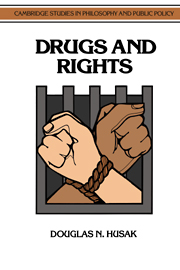3 - Drugs and harm to others
Published online by Cambridge University Press: 05 June 2012
Summary
I have described several difficulties that plague attempts to justify criminal laws against the recreational use of drugs (LAD) on paternalistic grounds, that is, because drugs are harmful to adults who use them. Some philosophers will have become impatient with this extended discussion. They may regard paternalistic arguments on behalf of LAD as quite beside the point. They may have little sympathy for paternalism in general, especially when it is “strong.” Even if they tolerate a limited extent of paternalism, I hope to have shown that a paternalistic defense of LAD is not compelling. Many philosophers believe that a more plausible justification for LAD is that the recreational use of drugs is harmful to others, that is, to nonusers. They will insist that the main defect with my attempt to draw analogies between drug use and other dangerous recreational pursuits such as skiing and mountain climbing is that these latter activities pose insignificant risks of harm to nonparticipants. In this chapter, I will explore this rationale for total prohibition of the recreational use of drugs by adults.
The “harm principle,” as it has come to be called, enjoys a privileged status in criminal law theory. Unlike paternalists, defenders of the harm principle need not struggle with the legitimacy of their rationale for legal intervention. No one (except anarchists) doubts that the criminal law should prohibit persons from causing harm to others.
- Type
- Chapter
- Information
- Drugs and Rights , pp. 145 - 208Publisher: Cambridge University PressPrint publication year: 1992



